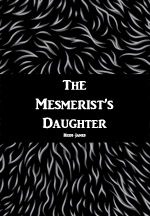The Mesmerist’s Daugher by Heidi James
-Reviewed by Cath Barton-
The Freudian theory about the child wanting to devour the mother who has nourished her is turned on its head in Heidi James’s vivid novella The Mesmerist’s Daughter. Published as a chapbook by Neon Books, this was originally included in an anthology of shorter fiction, Two Tall Tales and One Short Novel from Apis Books.
The narrator is a girl called Nicola who, from the age of four-and-a-half, experiences her mother as literally devouring her, every night.
“My mother was a wolf. That was the first secret I kept for her.”
That is the opening of the story, plunging the reader straight into the heart of the child’s unbearable life, burdened as it is with her mother’s secrets. Unbearable lives require radical strategies, so the child stops talking.
The story unfurls beautifully. The mother doesn’t look like a monster most of the time, but for reasons which her daughter does not understand – and so blames herself – tells lies which people believe. In Nicola’s eyes her mother mesmerises people. I love this choice of word, with its animalistic connotation of the wolf in sheep’s clothing and its onomatopoeic sound. I also love the way the complexity of an inner life is so clearly conveyed in the story – in an interspersed account, her doctors tell the grown Nicola that she imagined her mother to be a wolf to protect herself, but, as she herself tells us, our stories are our reality. If they are our escape they can also be our salvation, for if our life experience is painful or disappointing, stories are a way in which we can reinvent our world. They can’t, however, change other people:
“I prefer the memories of others, and have been collecting their stories to make my own. The past is a life you can remake, but I am not a liar. Not like her.”
This is a visceral story. For Nicola words are dangerous – her mother’s anger sank them into her flesh, ‘in a mess of linguistic splinters’; her Mum’s overheard conversation with her Dad contained ‘shards…piercing the floor’.
Sensations are vividly described, as in a memory with a traumatic connotation of a bus journey:
“…my sweaty legs gummed to the plastic cover where my dress had hitched up, stars in the flesh on the back of my hands.”
Smells are potent in all our memories, and stories. Nicola’s Dad is absent, working, for long periods. She runs to him when he returns: ‘He smelt of fish and old perfume’.
And then, she experiences bodily the tensions between her Mum and Dad:
‘The air in the kitchen was thin, snapped taut and impossible to breathe.’
‘The smell of steak-and-kidney pudding pounded the walls like a trapped bird.’
What happens in the story is tragic for the child Nicola and as a grown woman she has retreated into herself in a mental institution where, in spite of the noise, she finds ‘an odd peace’ and her nightmare, if so it be, has changed to give her a kind of catharsis. I find myself thinking of the uroborus, the eternally self-consuming Greek serpent. As an adult Nicola travels only in her imagination, in actuality confined in space and time. I would have liked more of the parallel narrative from the mental institution. The story as a whole is the briefest of novellas, and could have carried more of this present-day account within it. It is, that said, a powerful and most impressive piece of writing.

Reviewed by Cath Barton — Cath Barton’s prize-winning novella The Plankton Collector (2018) is published by New Welsh Rarebyte and her second novella, In the Sweep of the Bay (2020), by Louise Walter Books. Cath is also active in the on-line flash fiction community.
Photo © Toril Brancher
Twitter: @CathBarton1 | Website: cathbarton.com





